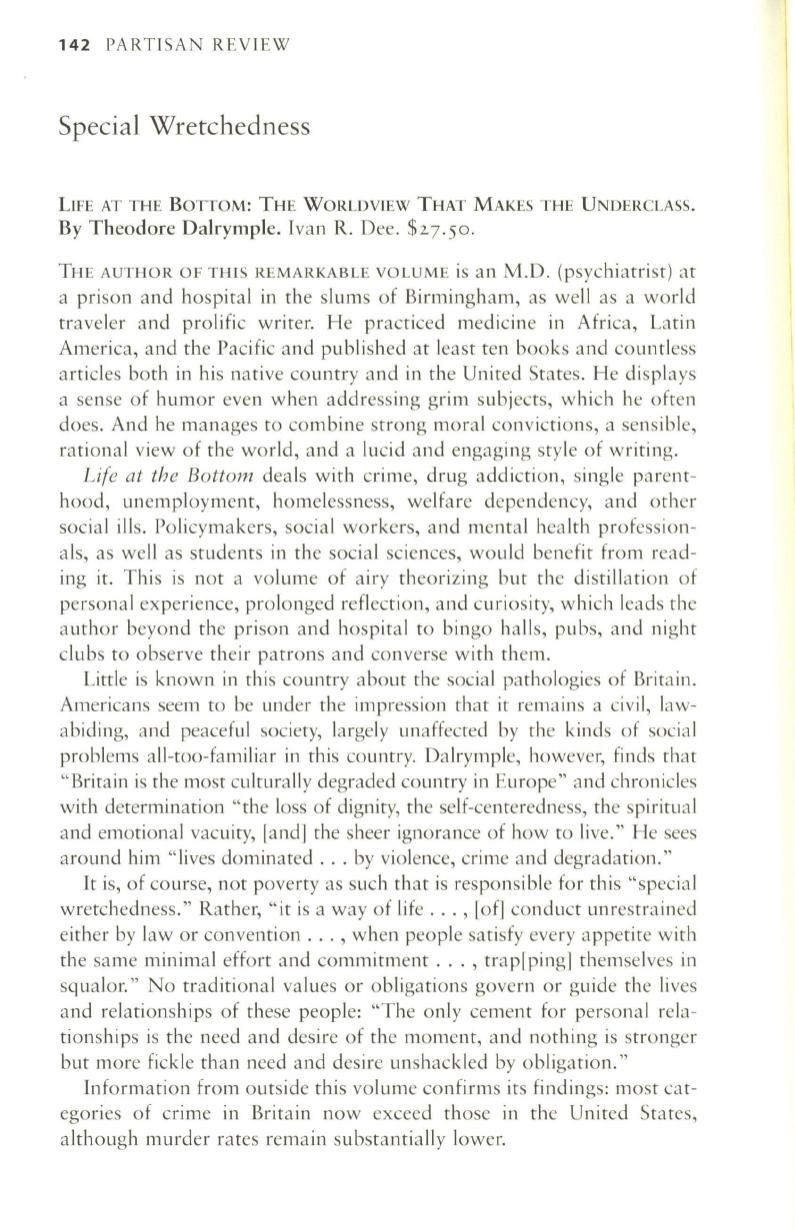
142
PARTISAN REVIEW
Special Wretchedness
LIFE AT THE BOlTOM: THE WORLDVIEW THAT MAKES THE UNDERCLASS.
By Theodore Dalrymple. Ivan R. Dee.
$27.50.
THE AUTHOR OF THIS REMARKABLE VOLUME is an M.D. (psychiatrist) at
a prison and hospital in the slums of Birmingham, as well as a world
traveler and prolific writer. He practiced medicine in Africa, Latin
America, and the Pacific and published at least ten books and countless
articles both in his native country and in the United States. He displays
a sense of humor even when addressing grim subjects, which he often
does. And he manages to combine strong moral convictions, a sensible,
rational view of the world, and a lucid and engaging style of writing.
Life at the Bottom
deals with crime, drug addiction, single parent–
hood, unemployment, homelessness, welfare dependency, and other
social ills. Policymakers, social workers, and mental health profession–
als, as well as students in the social sciences, would benefit from read–
ing it. This is not a volume of airy theorizing but the distillation of
personal experience, prolonged reflection, and curiosity, which leads the
author beyond the prison and hospital to bingo halls, pubs, and night
clubs to observe their patrons and converse with them.
Little is known in this country about the social pathologies of Britain.
Americans seem to be under the impression that it remains a civil, law–
abiding, and peaceful society, largely unaffected by the kinds of social
problems all-too-familiar in this country. Dalrymple, however, finds that
"Britain is the most culturally degraded country in Europe" and chronicles
with determination "the loss of dignity, the self-centeredness, the spiritual
and emotional vacuity, land] the sheer ignorance of how to live." He sees
around him "lives dominated ... by violence, crime and degradation."
It is, of course, not poverty as such that is responsible for this "special
wretchedness." Rather, "it is a way of life ... , [of] conduct unrestrained
either by law or convention ... , when people satisfy every appetite with
the same minimal effort and commitment ... , traplpingJ themselves in
squalor." No traditional values or obligations govern or guide the lives
and relationships of these people: "The only cement for personal rela–
tionships is the need and desire of the moment, and nothing is stronger
but more fickle than need and desire unshackled by obligation."
Information from outside this volume confirms its findings: most cat–
egories of crime in Britain now exceed those in the United States,
although murder rates remain substantially lower.


